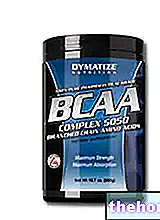Calcium citrate is the calcium salt of citric acid; it is widely used in the food industry as a synergistic antioxidant additive (E333), exploiting at the same time its acidity correcting and flavor enhancing properties (orange candies, sugared almonds, chewingum , fruit and fruit juices) Reading between the lines of nutritional labels, this additive is also common in cheeses and many frozen bakery products.

Each gram of calcium citrate contains about 210 milligrams of elemental calcium, just over half of that contained in one gram of calcium carbonate. These two salts are the most common sources of calcium in supplements and dietary products intended for supplementing the mineral, often enriched with vitamin D to favor its absorption. Since this becomes optimal in an acidic environment, calcium citrate is indicated for people suffering from hypochlorhydria and can also be taken on an empty stomach. Conversely, people suffering from stomach acid should prefer calcium carbonate, to be taken in conjunction with meals; alternatively, calcium carbonate can also be taken on an empty stomach in association with a fruit juice or citrus juice, natural sources of citric acid also containing small quantities of calcium citrate.
Bioavailability (absorption) of Calcium citrate
The carbonate salt has the advantage of convenience and in healthy people its absorption is practically identical, or only slightly lower, to that of calcium citrate.
Despite what has been stated, often for purely commercial purposes, various studies [1,2,3] underline the absence of significant differences in terms of absorption and bioavailability of calcium citrate and calcium carbonate in healthy people.
In some documents [4,5] there is talk of a better absorption of calcium citrate than calcium carbonate. However, considering the much more conspicuous cost of salt than citric acid, in healthy subjects the cost-effectiveness ratio is clearly in favor of calcium carbonate [3]. On the basis of the literature consulted, in the subject in good health, calcium carbonate taken in conjunction with meals it represents the most cost effective supplementary form. Conversely, calcium citrate is to be preferred in case of hypochlorhydria, in turn linked to the use of drugs against gastritis, peptic ulcer or reflux gastroesophageal, such as proton pump inhibitors and histamine H2 receptor antagonists [6]. The same goes for patients undergoing gastric bypass surgery, in which calcium citrate is preferable to carbonate [7].
Side effects and advice for use
Regardless of the calcium source chosen, remember that the percentage of mineral absorbed depends in the first instance on the dose: it is maximum for supplies of less than 500 mg and tends to decrease for higher supplies. Therefore, in the event that the doctor recommends a supplement with 1000 mg of calcium per day, it may be useful to divide the dose into two different daily intakes of 500 mg (a choice that must obviously be discussed with the doctor himself). In fact, we remind you that the use of calcium-based supplements should be discussed in advance with your doctor, especially in the presence of diseases or simultaneous use of drugs or other supplements. Conditions such as kidney stones, hyperparathyroidism and concomitant therapy with antacids, digoxin or antibiotics tetracycline (tetracycline, demeclocycline, doxycycline, minocycline or oxytetracycline), could in fact make them contraindicated or require dose adjustment.
Side effects of calcium citrate, in addition to an increase in gastric acidity in predisposed individuals, can include minor intestinal disorders such as bloating, nausea, and constipation.
Calcium citrate and kidney stones
The relationship between calcium supplement intake and kidney stone risk is still uncertain, given the conflicting epidemiological evidence, with studies even attributing a protective effect to calcium supplementation. In any case, one of the benefits classically ascribed to calcium citrate is the lower tendency to form kidney stones, while for commercial purposes it is even attributed a preventive role against the disease. Probably, reference is made to the known alkalizing effect of the urine exerted by citric acid; however, it should be remembered that by increasing the urinary pH, the risk of cystine, xanthine and uric acid stones is reduced, but the probability of renal phosphate concretions is increased. of calcium, calcium carbonate, magnesium phosphate and struvite [8] Therefore, in the presence of kidney stones, it is very important to consult a doctor before taking calcium citrate supplements.
Bibliography
1. Heaney RP, Dowell MS, Barger-Lux MJ. Absorption of calcium as the carbonate and citrate salts, with some observations on method. Osteoporos Int 9: 19–23, 1999
2. Chrischilles EA. Public health implications of interventions to promote calcium intake: cost-benefit considerations. Paper presented to the NIH Consensus Development Conference on Optimal Calcium Intake, June 1994, Washington, DC.
3. Heaney RP, Dowell MS, Bierman J, Hale CA, Bendich A (June 2001). "Absorbability and cost effectiveness in calcium supplementation". Journal of the American College of Nutrition 20: 239–46.
4. Heller HJ, Stewart A, Haynes S, Pak CYC: Pharmacokinetics of calcium absorption from two commercial calcium supplements. J Clin Pharmacol 39: 1151–1154, 1999.
5. Sakhaee K, Bhuket T, Adams-Huet B, Rao DS. Meta-analysis of calcium bioavailability: a comparison of calcium citrate with calcium carbonate. Am J Ther. 1999 Nov; 6: 313-21.
6. Straub DA. Calcium supplementation in clinical practice: a review of forms, doses, and indications. Nutr Clin Pract. 2007 Jun; 22: 286-96.
7. ondapu, P. and Provost, D. and Adams-Huet, B. and Sims, T. and Chang, C. and Sakhaee, K. (June 2009). "Comparison of the Absorption of Calcium Carbonate and Calcium Citrate after Roux-en-Y Gastric Bypass". Obesity Surgery 19: 1256–1261.
8. Wagner CA, Mohebbi N. "Urinary pH and stone formation." J Nephrol. 2010 Nov-Dec; 23 Suppl 16: S165-9.




























